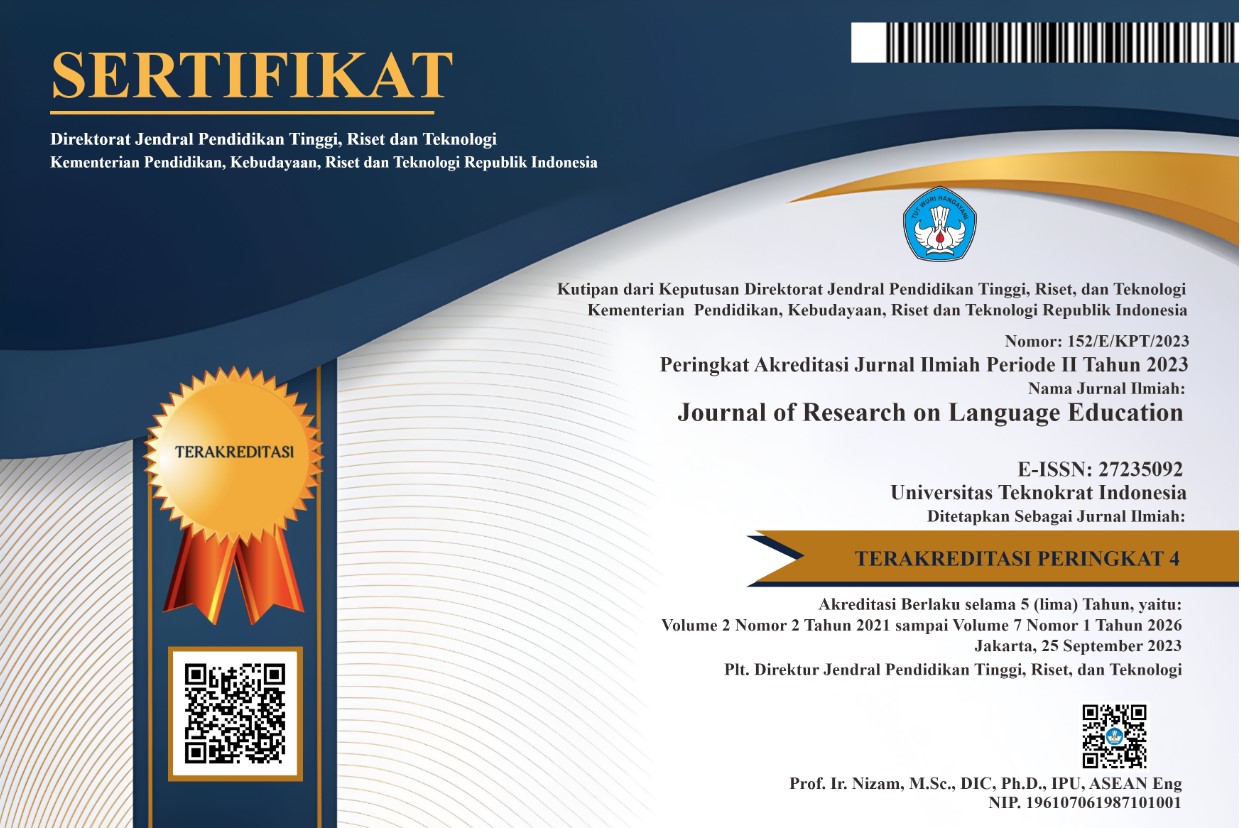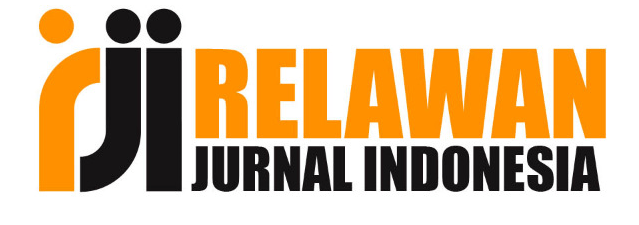PROMOTING MORE ENJOYABLE EFL READING LEARNING ENTERPRISES THROUGH AN ONLINE EXTENSIVE READING STRATEGY
Abstract
Abstract
The crux of modern EFL reading learning enterprises is no longer dependable on satisfying reading scores achieved by second language learners, yet it has been shifted to more transformative reading learning purposes. All these coveted EFL reading learning aspirations are exactly represented in an online extensive reading strategy where second language learners are rigorously commissioned to explore a huge number of digital reading passages to be accompanied by increasingly-rate reading velocity, fluency, and comprehension skills. In harmony with all these rewarding online extensive reading values, the researcher conducted this present small-scale library investigation to specifically unearth the extent an online extensive reading strategy can induce more favorable reading learning enterprises for worldwide EFL learners. Toward that end, the researcher harnessed an open-coding and a thematic analysis approach to produce more reliable, relatable, comprehensible, and applicable research results to be further internalized by the targeted EFL parties. To increase the relevancy of each single analyzed research result, the researcher selected 20 previously published online extensive reading strategy studies resided in varied reputable journal article platforms. The thematically categorized research results highly suggested worldwide second language reading educationalists start applying an online extensive reading strategy at the outset of their quotidian reading learning dynamics by which EFL learners can progressively transfigure into more motivated L2 readers under the limelight of more emotionally-supportive reading learning climates. These already-taken research results provide more exhaustive insights for globalized EFL reading experts, practitioners, and educationalists concerning the indispensability of online extensive reading strategy maximization in correspond with changeable reading learning environments.
Keywords: Online extensive reading strategy, globalized EFL learners, library investigation, thematic analysis
Keywords
Full Text:
PDFReferences
REFERENCES
Anshoriah, R. Al, Tandiana, S. T., & Abdullah, F. (2020). Profiling Learning Activities in Extensive Reading Course : A Case of Indonesian University Learners. Journal of Teaching & Learning English in Multicultural Contexts (Tlemc), 3(1), 30–42. http://jurnal.unsil.ac.id/index.php/tlemc/index
Bui, T., & Macalister, J. (2021). Online extensive reading in an EFL context: Investigating reading fluency and perceptions. Reading in a Foreign Language, 33(1), 1-29.
Chavangklang, T., Chavangklang, P., Thiamhuanok, S., & Sathitdetkunchorn, P. (2019). Development of EFL University Students’ Vocabulary Size and Reading Comprehension Using Online Multimedia-based Extensive Reading. Advances in Language and Literary Studies, 10(5), 146. https://doi.org/10.7575/aiac.alls.v.10n.5p.146
Elturki, E., & Harmon, E. (2020). Systematic integration of extensive reading in the curriculum: Strategies and resources. TESOL Journal, 11(3), 1–12. https://doi.org/10.1002/tesj.517
Fatimah, A. S. (2019). Portraying Learner’s Autonomy in Extensive Reading Classroom. OKARA: Jurnal Bahasa Dan Sastra, 13(1), 35. https://doi.org/10.19105/ojbs.v13i1.2228
Fatimah, A. S., Marlina, N., & Dewi, N. S. N. (2022). Scrutinizing Activities in Online Extensive Reading Classroom: Highlighting Students’ Voice. AL-ISHLAH: Jurnal Pendidikan, 14(3), 2993–3006. https://doi.org/10.35445/alishlah.v14i3.1236
Harimurti, K. F., Suryati, N., & Astuti, U. P. (2021). Students’ Perspectives in Using XReading as an Extensive Reading Platform for Higher Education Students. JoLLA: Journal of Language, Literature, and Arts, 1(12), 1627–1643. https://doi.org/10.17977/um064v1i122021p1627-1643
Howarth, M., & Bollen, D. (2019). Student perceptions of an online extensive reading platform. The Bulletin of Sojo University, 44, 145–151.
Huynh, P. (2022). Extensive reading on postgraduate students' perceptions and its effects on reading comprehension. Available at SSRN 4272049.
Kirchhoff, C., & Mision, M. (2022). Audio-assisted Extensive Reading: Learners’ Experience and Attitudes. The Reading Matrix: An International Online Journal, 22(2), 1–12.
Li, H., Majumdar, R., Chen, M. R. A., & Ogata, H. (2021). Goal-oriented active learning (GOAL) system to promote reading engagement, self-directed learning behavior, and motivation in extensive reading. Computers and Education, 171(July). https://doi.org/10.1016/j.compedu.2021.104239
Machfudi, M. I., & Ferdiansyah, S. (2023). A tale from extensive readers in an online extensive reading classroom. Qualitative Research Journal, 8(3), 1-10.
Mark, Howarth., & Bollen, D. (2020). Teacher perceptions of an online extensive reading platform. Journal of English Education, 45(2), 35-40.
Mbato, C. L. (2019). Indonesian EFL Learners’ Critical Thinking in Reading: Bridging the Gap between Declarative, Procedural and Conditional Knowledge. Jurnal Humaniora, 31(1), 92. https://doi.org/10.22146/jh.v31i1.37295
Meinawati, E., Purwaningrum, P. W., & Setianingrum, H. W. (2021). The Online English Extensive Reading Activities Using Google Classroom in Pandemic Covid-19. Eralingua: Jurnal Pendidikan Bahasa Asing Dan Sastra, 5(2), 459–469.
Meniado, J. C. (2021). Extensive reading practices in the Arabian Gulf region. Eurasian Journal of Applied Linguistics, 7(1), 222–239. https://doi.org/10.32601/ejal.911262
Milliner, B. (2021). The Effects of Combining Timed Reading, Repeated Oral Reading, and Extensive Reading. Reading in a Foreign Language, 33(2), 191–211. https://nflrc.hawaii.edu/rfl/
Ng, Q. R., Renandya, W. A., & Chong, M. Y. C. (2019). Extensive reading: Theory, research and implementation. TEFLIN Journal, 30(2), 171-186.
Permatasari, I., Wijayanto, A., & Kristina, D. (2020). Extensive Reading on Wattpad and Its Benefits to Students’ English Skills: Students’ Perceptions. ELS Journal on Interdisciplinary Studies in Humanities, 3(4), 518–530. https://doi.org/10.34050/elsjish.v3i4.11714
Pongsatornpipat, Warangkan. (2021). Interactive group in extensive reading to enhance reading ability of thai undergraduate students. LEARN Journal: Language Education and Acquisition Research Network, 14(2), 342–371.
Pongsatornpipat, Warangkana. (2022). An Implementation of Online Extensive Reading to Improve Reading Comprehension of Social Work Students. Theory and Practice in Language Studies, 12(11), 2291–2297. https://doi.org/10.17507/tpls.1211.08
Prihartono, D. (2021). Engaging Extensive Reading Practice Mediated By Let’S Read Asia in Online Classroom. ISLLAC : Journal of Intensive Studies on Language, Literature, Art, and Culture, 5(2), 191. https://doi.org/10.17977/um006v5i22021p191-202
Puripunyavanich, M. (2021). Revealing University Students’ Attitudes toward Online Extensive Reading in Thailand. REFLections, 28(2), 248–266.
Puripunyavanich, M. (2022). The Implementation of a Large-scale Online Extensive Reading Program in Thailand-From Decision-making to Application. LEARN Journal: Language Education and Acquisition Research Network, 15(1), 320–360.
Raunaq, M. N., Mustofa, M., & Nur Habibah, E. (2021). the Students’ Perception of Extensive Reading in Online Learning At Flsp Class. Journal of English for Academic and Specific Purposes, 4(1), 152–164. https://doi.org/10.18860/jeasp.v4i1.12618
Robb, T. (2018). An introduction to online sites for extensive reading. Tesl-Ej, 22(1), 1–16.
Sargeant, J. (2012). Qualitative research part II: Participants, analysis, and quality assurance. Journal of graduate medical education, 4(1), 1-3.
Wijaya, K. (2021). The Important Role of Extensive Reading Strategy in Indonesian EFL Learning Contexts. Acuity: Journal of English Language Pedagogy, Literature and Culture, 6(2), 107–117. https://doi.org/10.35974/acuity.v6i2.2482
Wijaya, K. F. (2022). Investigating English Education Master Students’ Perceptions on Extensive Reading Strategy. Polyglot: Jurnal Ilmiah, 18(1), 19. https://doi.org/10.19166/pji.v18i1.4113
World Economic Forum, J. (2020). The future of jobs report 2020. Retrieved from Geneva.
Yamashita, J. (2015). In Search of the Nature of Extensive Reading in L2: Cognitive, Affective, and Pedagogical Perspectives. Reading in a Foreign Language, 27(1), 168–181. http://nflrc.hawaii.edu/rfl/April2015/discussion/yamashita.pdf
Zhou, J., & Day, R. R. (2017). Online extensive reading in EAP courses. Reading in a Foreign Language, 33(1), 103–125. http://nflrc.hawaii.edu/rfl
DOI: https://doi.org/10.33365/jorle.v5i1.3391
Refbacks
- There are currently no refbacks.

This work is licensed under a Creative Commons Attribution-NonCommercial-ShareAlike 4.0 International License.

Articles published in Journal of Research on Language Education is licensed
under a Creative Commons Attribution-ShareAlike 4.0 International License.
English Education Study Program, Faculty of Arts and Education.
Universitas Teknokrat Indonesia
Zainal Abidin Pagaralam 9-11 Bandar Lampung, Indonesia
All rights reserved.








